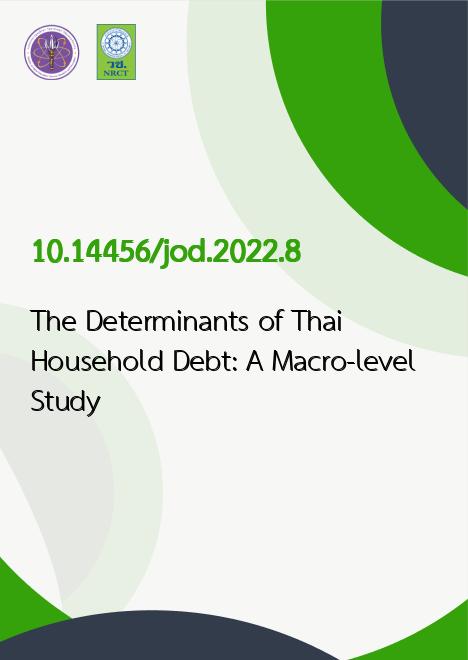
|
The Determinants of Thai Household Debt: A Macro-level Study |
|---|---|
| รหัสดีโอไอ | |
| Creator | Pakarat Jumpanoi |
| Title | The Determinants of Thai Household Debt: A Macro-level Study |
| Contributor | Wanakiti Wanasilp |
| Publisher | วิทยาลัยประชากรศาสตร์ |
| Publication Year | 2565 |
| Journal Title | วารสารประชากรศาสตร์ |
| Journal Vol. | 38 |
| Journal No. | 2 |
| Page no. | 71-84 |
| Keyword | Household debt, Autoregressive Distributed Lag model, Bound test, Working-age population, Error correction model |
| URL Website | http://www.cps.chula.ac.th/newcps/journalnew/index.php |
| Website title | วารสารประชากรศาสตร์ |
| ISSN | 0857-2143 |
| Abstract | During 2020-2021, COVID-19 precipitated a significant decline in Thai household income, causing the average household debt service ratio to rise above 30 per cent and household consumption to fall, followed by a slow economic recovery. Although the determinants of household debt in Thailand have already been studied, most research has focused on the micro-level. Therefore, this study aimed to evaluate the long-term link between Thai household debt and gross domestic product, unemployment rates, interest rates, and working-age population from Q1/2007 to Q1/2022. An Augmented Dickey-Fuller unit root test, an Autoregressive Distributed Lag Model bound test, and an Error Correction Model were applied. This study found that in the long run, gross domestic product and unemployment rates harm Thai household debt, while interest rates and working-age population have a positive effect. In addition, the working-age population has a statistically significant positive effect on household debt. Policymakers may need to develop policies for limiting household debt to an appropriate level. Implementing a programme to encourage private saving, investing, and financial planning would assist individuals in reducing debt. |